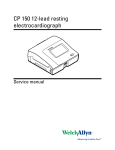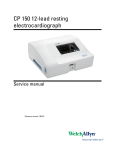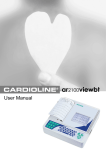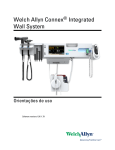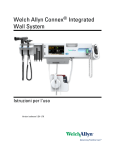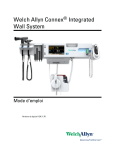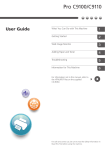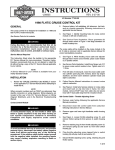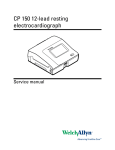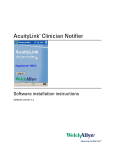Download Service manual
Transcript
CP 50 and CP 50 Plus 12-lead resting electrocardiograph ™ Service manual ™ ii Welch Allyn CP 50 and CP 50 Plus 12-lead resting electrocardiograph Copyright 2013 Welch Allyn. All rights are reserved. To support the intended use of the product described in this publication, the purchaser of the product is permitted to copy this publication, for internal distribution only, from the media provided by Welch Allyn. No other use, reproduction, or distribution of the publication, or any part of it, is permitted without written permission from Welch Allyn. All rights are reserved. Caution Federal US law restricts sale of the device identified in this manual to, or on the order of, a licensed physician. Welch Allyn assumes no responsibility for any injury, or for any illegal or improper use of the product, that may result from failure to use this product in accordance with the instructions, cautions, warnings, or indications for use published in this manual. Welch Allyn is a registered trademark of Welch Allyn, Inc. CP 50 and CP 50 Plus are trademarks of Welch Allyn, Inc. Software in this product is copyright Welch Allyn or its vendors. All rights are reserved. The software is protected by United States of America copyright laws and international treaty provisions applicable worldwide. Under such laws, the licensee is entitled to use the copy of the software incorporated within this instrument as intended in the operation of the product in which it is embedded. The software may not be copied, decompiled, reverse-engineered, disassembled or otherwise reduced to human-perceivable form. This is not a sale of the software or any copy of the software; all right, title and ownership of the software remains with Welch Allyn or its vendors. Caution Changes or modifications not expressly approved by Welch Allyn could void the purchaser’s authority to operate the equipment. For information about any Welch Allyn product, contact Welch Allyn Technical Support (www.welchallyn.com/support) or visit www.welchallyn.com/about/company/locations.htm. Manual Material No. 105488 Ver. F Welch Allyn Limited Navan Business Park Dublin Road Navan, County Meath Republic of Ireland Tel.: +353 46 90 67700 Fax: +353 46 90 67755 Welch Allyn, Inc. 4341 State Street Road Skaneateles Falls, NY 13153-0220 USA Service manual Contents iii Contents 1 - Safety summary . . . . . . . . . . . . . . . . . . . . . . . . . . . . . . . . . . . . . . . . . 1 Purpose of this manual . . . . . . . . . . . . . . . . . . . . . . . . . . . . . . . . . . . . . . . . . . . . . 1 Service policy . . . . . . . . . . . . . . . . . . . . . . . . . . . . . . . . . . . . . . . . . . . . . . . . . . . . 1 Symbols . . . . . . . . . . . . . . . . . . . . . . . . . . . . . . . . . . . . . . . . . . . . . . . . . . . . . . . . 2 General Warnings . . . . . . . . . . . . . . . . . . . . . . . . . . . . . . . . . . . . . . . . . . . . . . . . . 2 Warnings related to the environment. . . . . . . . . . . . . . . . . . . . . . . . . . . . . . . 2 Warnings related to accessories and other equipment . . . . . . . . . . . . . . . . . 3 Warnings related to using the electrocardiograph . . . . . . . . . . . . . . . . . . . . . 4 General Cautions . . . . . . . . . . . . . . . . . . . . . . . . . . . . . . . . . . . . . . . . . . . . . . . . . 4 Electrostatic discharge (ESD) . . . . . . . . . . . . . . . . . . . . . . . . . . . . . . . . . . . . . . . . 6 2 - Export and import process . . . . . . . . . . . . . . . . . . . . . . . . . . . . . . . . . 7 3 - Update process . . . . . . . . . . . . . . . . . . . . . . . . . . . . . . . . . . . . . . . . . . 9 4 - Upgrade process . . . . . . . . . . . . . . . . . . . . . . . . . . . . . . . . . . . . . . . . 11 5 - Performing a full-functional test . . . . . . . . . . . . . . . . . . . . . . . . . . . 13 6 - Troubleshooting . . . . . . . . . . . . . . . . . . . . . . . . . . . . . . . . . . . . . . . . 15 iv Contents Welch Allyn CP 50 and CP 50 Plus 12-lead resting electrocardiograph 1 1 Safety summary All service technicians of the electrocardiograph must read this safety summary and all warning and caution statements in the manual. Any internal part(s) replacement or assembly and reassembly must be performed by qualified service personnel with an understanding of technical English. When a service part is ordered, verbal confirmation of these qualifications will be recorded before the sale. Purpose of this manual The purpose of this manual is to assist with some common troubleshooting scenarios you may encounter and to explain the export and import, update, and upgrade process. Service policy All repairs on products under warranty must be performed by Welch Allyn or by a service provider authorized by Welch Allyn. Unauthorized repairs will void the warranty. In addition, whether or not covered under warranty, any product repair should be performed exclusively by Welch Allyn or by a service provider that has been authorized by Welch Allyn. If the product fails to function properly—or if you need assistance, service, or spare parts—contact the nearest Welch Allyn Technical Support Center. Before contacting Welch Allyn, try to duplicate the problem, and check all accessories to ensure that they are not causing the problem. When calling, please be prepared to provide: • Product name, model number, and serial number of your product. • Complete description of the problem. • Complete name, address and phone number of your facility. • For out-of-warranty repairs or spare parts orders, a purchase order (or credit card) number. • For parts orders, the required spare or replacement part numbers. If your product requires warranty, extended warranty, or non-warranty repair service, please call first the nearest Welch Allyn Technical Support Center. A representative will assist you troubleshooting the problem and will make every effort to solve it over the phone, avoiding potential unnecessary return of your product. In case a return cannot be avoided, the representative will record all necessary information and will provide a Return Material Authorization (RMA) number, as well as the 2 Safety summary Welch Allyn CP 50 and CP 50 Plus 12-lead resting electrocardiograph appropriate return address. An RMA number must be obtained prior to any return. If you have to return your product for service, follow these recommended packing instructions: • Remove all hoses, cables, sensors, power cords, and other accessories (as appropriate) before packing, unless you suspect they are associated with the problem. • Wherever possible use the original shipping carton and packing materials. • Include a packing list and the Welch Allyn Return Material Authorization (RMA) number. It is recommended that all returned goods be insured. Claims for loss or damage to the product must be initiated by the sender. Symbols WARNING Indicates conditions that could lead to illness, injury, or death. Caution Indicates conditions that could damage equipment or other property. General Warnings Warnings indicate conditions or practices that could lead to illness, injury, or death. Warnings related to the environment WARNING To avoid a possible explosion, do not use the electrocardiograph in the presence of flammable anesthetics: mixtures containing air, oxygen, or nitrous oxide. WARNING When transporting the electrocardiograph on a cart, tuck the patient cable away from the wheels so that it does not present a hazard. Service manual Safety summary 3 Warnings related to accessories and other equipment WARNING For operator and patient safety, peripheral equipment and accessories that can come in direct patient contact must be in compliance with all appropriate safety, EMC, and regulatory requirements. WARNING All signal input and output (I/O) connectors are intended for connection of only devices complying with IEC 60601-1, or other IEC standards (for example, IEC 60950), as appropriate to the device. Connecting additional devices to the electrocardiograph might increase chassis or patient leakage currents. To maintain operator and patient safety, consider the requirements of IEC 60601-1-1. Measure the leakage currents to confirm that no electric shock hazard exists. In the case of a USB printer, the printer (non-medical electrical equipment) shall be situated outside the patient environment (reference IEC 60601-1-1). The printer used should be approved to the appropriate safety standard for non-medical electrical equipment (IEC 60950, or its national variants), and use of an isolation transformer is recommended. If there is a requirement for the printer to be situated within the patient environment it is the responsibility of the user to ensure that the system provides a level of safety in compliance with IEC 60601-1 and 60601-1-1. WARNING The electrocardiograph has not been designed for use with highfrequency (HF) surgical equipment and does not protect against hazards to the patient. Warnings related to using the electrocardiograph WARNING To avoid serious injury or death, take these precautions during patient defibrillation: • Avoid contact with the electrocardiograph, patient cable, and patient. • Verify that the patient leads are properly connected. • Place defibrillator paddles properly in relation to electrodes. • After defibrillation, pull each patient lead out of the patient cable and inspect the tips for charring (black carbon marks). If there is any charring, the patient cable and individual leads must be replaced. If there is no charring, fully reinsert the leads into the patient cable. (Charring can occur only if a lead is not fully inserted into the patient cable before defibrillation. WARNING To prevent the spread of infection, take these precautions: • Dispose of single-use components (for example, electrodes) after using them once. • Regularly clean all components that come in contact with patients. • Avoid ECG testing for patients with open, infectious sores. WARNING Avoid positioning any leads or cables so that they could easily trip someone or become wrapped around a patient’s neck. WARNING To ensure safe use of the device, follow the documented maintenance procedures. WARNING Only qualified service personnel should attempt to repair the electrocardiograph. In case of a malfunction, call Technical Support. 4 Safety summary Welch Allyn CP 50 and CP 50 Plus 12-lead resting electrocardiograph WARNING Do not perform ST segment analysis on the ECG screen display, since these ECG representations are scaled. Make manual measurements of ECG intervals and magnitudes on printed ECG reports only. WARNING To avoid injury, do not touch the print head immediately after printing. It might be hot. General Cautions Cautions indicate conditions or practices that could damage the equipment or other property. Caution When removing the electrocardiograph from storage, allow it to thermally stabilize to surrounding environmental conditions before using it. Caution To prevent possible damage, do not use sharp or hard objects to press the touch screen or the buttons. Only use fingertips. Caution Do not expose the patient cable to strong ultraviolet radiation. Caution Do not pull or stretch the patient cable. Doing so could result in mechanical or electrical failures. Form the patient cable into a loose loop before storing. Caution Avoid positioning the patient cable where it might get pinched, stretched, or stepped on. Otherwise, measurements might no longer be accurate, and repair might be necessary. Caution Using the equipotential terminal for anything but grounding purposes may contribute to damage of the device. Caution Use only parts and accessories supplied with the device and available through Welch Allyn. The use of accessories other than those specified may result in degraded performance or unsafe use of this device. Caution Portable and mobile RF communications equipment can affect the performance of the electrocardiograph. Caution The electrocardiograph meets the Class A requirements of IEC 606011-2 regarding incidental emission of radio frequency interference. As such it is suitable for use in commercial grade electrical environments. If the electrocardiograph is used in residential grade electrical environments and you experience incidental interference with other equipment that uses radio frequency signals to operate, minimize the interference. Caution Other medical equipment—including but not limited to defibrillators, ultrasound machines, pacemakers, and other stimulators—may be used simultaneously with the electrocardiograph. However, such devices may disturb the electrocardiograph signal. Caution The power cord must be disconnected from AC power before cleaning, maintaining, transporting, or servicing. Caution The requirements of AAMI EC11, Section 3.2.7.2, Frequency and Impulse Response, for an impulse triangle waveform may be impacted by up to 5 milliseconds of small amplitude dampened ringing immediately after the impulse when the muscle filter (35 Hz) is turned on or a small amplitude offset when the baseline filter (0.5 Hz) is turned on. These requirements are unaffected by any other combination of filters turned on or off. Measurements performed by the optional interpretation algorithm are unaffected by any filter selections. Caution Federal US law restricts sale of the device identified in this manual to, or on the order of, a licensed physician. Service manual Safety summary 5 Electrostatic discharge (ESD) CAUTION SENSITIVE ELECTRONIC DEVICES DO NOT SHIP OR STORE NEAR STRONG ELECTROSTATIC, ELECTROMAGNETIC, MAGNETIC OR RADIOACTIVE FIELDS. ATTENTION OBSERVE PRECAUTIONS FOR HANDLING ELECTROSTATIC SENSITIVE DEVICES Caution Electrostatic discharge (ESD) can damage or destroy electronic components. Handle static-sensitive components only at static-safe workstation. Caution Assume that all electrical and electronic components of the monitor are static-sensitive. Electrostatic discharge is a sudden current flowing from a charged object to another object or to ground. Electrostatic charges can accumulate on common items such as foam drinking cups, cellophane tape, synthetic clothing, untreated foam packaging material, and untreated plastic bags and work folders, to name only a few. Electronic components and assemblies, if not properly protected against ESD, can be permanently damaged or destroyed when near or in contact with electrostatically charged objects. When you handle components or assemblies that are not in protective bags and you are not sure whether they are static-sensitive, assume that they are static-sensitive and handle them accordingly. • Perform all service procedures in a static-protected environment. Always use techniques and equipment designed to protect personnel and equipment from electrostatic discharge. • Remove static-sensitive components and assemblies from their static-shielding bags only at static-safe workstations—a properly grounded table and grounded floor mat—and only when you are wearing a grounded wrist strap (with a resistor of at least 1 megohm in series) or other grounding device. • Use only grounded tools when inserting, adjusting, or removing static-sensitive components and assemblies. • Remove or insert static-sensitive components and assemblies only with monitor power turned off. • Insert and seal static-sensitive components and assemblies into their original static-shielding bags before removing them from static-protected areas. • Always test your ground strap, bench mat, conductive work surface, and ground cord before removing components and assemblies from their protective bags and before beginning any disassembly or assembly procedures. 6 Safety summary Welch Allyn CP 50 and CP 50 Plus 12-lead resting electrocardiograph 7 2 Export and import process ECG Tests and configuration files can be exported and imported for backup purposes or to configure multiple CP 50 devices. To begin the export or import process, connect a USB mass storage device to the CP 50. 1. Touch Menu, Service. 2. Login to the CP 50 device. The default User ID is 7378423 and the default Password is 6676737. 3. Touch the OK button 4. Touch the Next button. 5. Touch the Other tab. 6. Touch Data. 7. Select the files to send or import. Only one file can be selected at a time. Select either Tests, Audit Trail, Log, or Configuration. 8 Export and import process Welch Allyn CP 50 and CP 50 Plus 12-lead resting electrocardiograph The following table details when each item is available to export or import, based on the file type selected. File type Actions enabled Tests ECG test files Print, Delete, Export, Import Audit Trail The audit trail captures the Print, Delete chronological sequence of auditable actions. Log The log captures status and error events. Status events are events that are expected. Error events are events that are unexpected. The log is used for debugging purposes. Print, Delete, Export Configuration The configuration file Print, Delete, Export, Import stores information used to initialize the device. 8. Touch Send or Import. 9. If the send or import was successful, a message will display indicating that files have been successfully sent or imported. 10. Select another option for send or import, if necessary. 9 3 Update process Complete the update process on your CP 50 device to install a newer version of software for continuous product improvements. Complete the following steps to update the CP 50 software: 1. Turn on the device. 2. Connect the USB storage device with the update files to the CP 50 device. 3. Touch Menu, Settings, System, Updates. 4. The software update progress screen displays. 5. Once the update is complete, the CP 50 device will automatically reboot. 10 Update process Welch Allyn CP 50 and CP 50 Plus 12-lead resting electrocardiograph 11 4 Upgrade process Complete the upgrade process on your CP 50 device to add new options or functionality to the device. To upgrade the CP 50 software, complete the following steps: 1. Touch Menu, Settings, System, Upgrades. 2. Touch Upgrade. 3. Ensure the serial number on the upgrade material matches the serial number located on the base housing. 4. Enter the Activation Code, and then touch the OK button. 5. All enabled options will display. 12 Upgrade process Welch Allyn CP 50 and CP 50 Plus 12-lead resting electrocardiograph 13 5 Performing a full-functional test Complete a full-functional CP50 test to verify CP 50 device functionality. The following table details what features the functional tests will verify: Test Button CP50 Features Tested • Battery • Audio • USB Host • USB Client • Keypad • ECG • Printer Pattern • Printer Speed • Ethernet Printer Test • • Printer Pattern Printer Speed To access the Tests screen, complete the following steps: 1. Touch from the Main screen. Note A menu button is also located on the ECG Preview screen. 14 Performing a full-functional test Welch Allyn CP 50 and CP 50 plus 12-lead resting electrocardiograph 2. Touch the Service button. 3. Enter the User ID and Password. The default User ID is 7378423, and the default password is 6676737. 4. The Tests screen displays. Select either CP50 or Printer and follow the instructions on the test screens. If any of the tests fail, contact Technical Support. 15 6 Troubleshooting Complete a full-functional test prior to troubleshooting the CP 50 device. System problems: Condition Causes Actions The electrocardiograph won't • An AC fuse is blown. power up when it is plugged into • There is no AC power. AC power, and the AC power LED is not lit. 1. Check the AC fuses. 2. Check the AC power source. The electrocardiograph won't • LCD screen is faulty. power up when it is plugged into • AC power connection is AC power, and the AC power LED faulty. is lit. 1. See Blank LCD screen below. 2. Check and reseat the AC to power supply harness. The electrocardiograph won't power up when it is unplugged. • The battery is disconnected. • The battery is low. • Battery is not charging, is depleted, or faulty. 1. Check the battery connections. 2. Charge the battery. 3. Replace the battery. Battery will not charge or shows disconnected • Faulty battery. • Damaged pins on battery connection point. 1. Replace battery 2. Replace base housing When connected to AC power with the battery installed, the battery status is displaying a missing battery icon. Faulty battery. Replace battery. The electrocardiograph prints fewer than 10 reports on a full battery charge. The battery is degraded. Replace battery. While powered-on, the electrocardiograph does not respond when you press buttons or touch the screen. The electrocardiograph is frozen. Reset the electrocardiograph by pressing and holding the power button for at least six seconds until the screen goes blank. Press the power button again. The electrocardiograph will go through some diagnostic tests that will cause it to take longer than usual to power up. No response from membrane key(s). • Loose or disconnected membrane cable. • Faulty membrane key. 1. Reseat the membrane harness at the micro compute engine board. 2. Replace membrane keypad (top housing assembly kit). When auto button is pressed, rhythm ECG starts or vice versa Membrane keys short circuited. Replace membrane keypad (top housing assembly kit). 16 Troubleshooting Welch Allyn CP 50 and CP 50 plus 12-lead resting electrocardiograph System problems: Condition Causes Actions Blank LCD screen, and the AC power LED is lit. • Loose or disconnected LCD cable. • LCD faulty. 1. Reseat the LCD cable at the micro compute engine board. 2. Replace LCD (top housing assembly kit). Blank LCD screen and the AC power LED is not lit. • AC power is faulty or disconnected. See The electrocardiograph won't power up when it is plugged into AC power, and the AC power LED is lit condition. Off colored display • Loose LCD cable • Faulty LCD display 1. Reseat LCD cable at the micro compute engine board. 2. Replace LCD (top housing assembly kit). No response when LCD screen is touched • Touch membrane connection is loose or disconnected. • Touch membrane failed. • Touch screen controller failed. 1. Reseat the LCD harness on the micro compute engine board. 2. Replace LCD (top housing assembly kit). 3. Replace the micro compute engine board. Unable to obtain a valid IP • Local network problem address when DHCP is turned on. • Communication board disconnected. 1. Verify working network connection 2. Reseat communication board connection. Incorrect waveform while connected to simulator • Faulty patient cable • Loose ECG harness • Faulty ECG board 1. Replace patient cable. 2. Reseat ECG harness. 3. Replace ECG board. All leads showing off • Faulty patient cable • Loose ECG harness • Faulty ECG board 1. Replace patient cable. 2. Reseat ECG harness. 3. Replace ECG board. Condition Causes Actions No paper feed • Paper jam • Lost communication 1. 2. 3. 4. Reload paper. Reseat printer harness. Complete a printer functional test. Replace printer. Paper is blank • Lost communication • Printer door open • Error loading paper 1. 2. 3. 4. Reseat printer. Replace printer. Check printer door. Check paper orientation. Printer perform line feed on Roll paper for a period of time Paper type configured for Z-fold instead of Roll Check paper type settings in Menu, System, Hardware. Printer does not line feed to perforated edge of Z-fold paper Paper type configured for paper roll instead of Z-fold Check paper type settings in Menu, System, Hardware. When using rolled paper, the paper starts to slant after numerous printing Paper roll rod is missing. Use paper roll rod. Uneven print result Thermal head damaged Replace printer. Printer Problems: Service manual Troubleshooting Printer Problems: Condition Causes Actions External printer is not printing • Printer is not online • Printer is not powered up • Printer is not configured properly • Printer connection is faulty 1. Check that the printer is powered up and online. 2. Verify whether external printer option is configured. 3. Check and verify the printer connection using another printer cable. The electrocardiograph shuts down during printing when in battery mode. The battery is low or faulty. Recharge or replace the battery. Printing is not clear or garbled. Foreign particles on printer heating Clean the heating element on the element. printer to remove any foreign particles. Wipe off the heating element part of the head surface lightly with cotton swabs with IsoPropyl alcohol applied and allow to dry completely. User Interface Messages: Condition Causes Actions Battery is critically low. Shutting down... Device automatically shuts down If unable to charge the battery, replace when it reaches the shutdown the battery. capacity. This prevents file system corruption. May lose the last unsaved test. ECG front-end microprocessor board error. Call Technical Support. ECG Front End detects CPLD Voltage error which indicates that any ECG data received from it are invalid. The Front End will notify the microcompute engine and will display this error. When the error is acknowledged, the device will shutdown. Destination is unavailable or full. The import source is unavailable. • Faulty communication module 1. Replace communication board (part • Disconnected harness of the microcompute engine • Faulty MicroCompute engine replacement kit). 2. Replace microcompute engine. The internal printer's cue marker check failed. Reload the paper. Configured paper type is set to Zfold but roll paper is used. Printer is unable to detect cue marker. Check connection to the ECG board. If connection is okay, order ECG board kit. If the ECG front end error is still received, replace the Micro compute engine board. Check paper type settings in Menu, System, Hardware. 17 18 Troubleshooting Welch Allyn CP 50 and CP 50 plus 12-lead resting electrocardiograph User Interface Messages: Condition Causes Actions Internal printer error. Call Technical Support. The printer error includes the following: 1. Fuse blown (replace printer FSS). 2. RAM error (replace printer FSS). 3. MCU error (replace printer FSS). 4. Print head Temperature above 90C (replace printer FSS). 5. Printhead flex cables disconnected (check flex cables connection). 6. Flash memory error (replace printer FSS). Check communication between the printer board and communication board. If the board tries to communicate with the printer and the printer responds with an error message, then complete a printer functional test to ensure printer is operating properly. Extended printing causing print head to overheat. If printing at a high speed for an extended period of time, the printer will overheat and will notify the microcompute engine board that it is overheating and needs to stop and cool down. Internal printer is overheated. Wait ten minutes, and retry. Check flex cables on printer to see if they are loose. If problem persists, replace the printer. Call Technical Support if printer displays this message when high-speed printing has not taken place. Check that the thumb drive and port are working properly. If using another thumb drive results in the same error, call Technical Support. The read-back file is corrupted. During Service USB Host test, the content read back from file does not match the content previously written Internal printer is out of paper. Reload. Configured paper type is roll but Z- Check paper type settings in Menu, fold paper is used. The cue marker System, Hardware. is on the paper sensor causing the printer to incorrectly identify paper out. CP 50 Replacement Kit Part Numbers Kit Part Number CP50 TOP HSNG ASSY SERVICE KIT CP50-001 CP50 BASE HSNG ASSY SERVICE KIT CP50-002 CP50 UCE & COMM ASSY SERVICE KIT CP50-003 CP50 4” PRINTER ASSY SERVICE KIT CP50-004 CP50 ECG ASSY SERVICE KIT CP50-005 CP50 POWER SUPPLY SERVICE KIT CP50-011 CP50 BATTERY PACK BATT33 Manual Material No. 105488 Ver. F Welch Allyn Limited Navan Business Park Dublin Road Navan, County Meath Republic of Ireland www.welchallyn.com Welch Allyn, Inc. 4341 State Street Road Skaneateles Falls, NY 13153-0220 USA

























